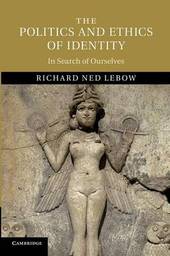
|
The Politics and Ethics of Identity: In Search of Ourselves
Paperback / softback
Main Details
| Title |
The Politics and Ethics of Identity: In Search of Ourselves
|
| Authors and Contributors |
By (author) Richard Ned Lebow
|
| Physical Properties |
| Format:Paperback / softback | | Pages:444 | | Dimensions(mm): Height 229,Width 152 |
|
| ISBN/Barcode |
9781107675575
|
| Classifications | Dewey:320.01 |
|---|
| Audience | | Professional & Vocational | |
|---|
| Illustrations |
Worked examples or Exercises
|
|
Publishing Details |
| Publisher |
Cambridge University Press
|
| Imprint |
Cambridge University Press
|
| Publication Date |
20 March 2014 |
| Publication Country |
United Kingdom
|
Description
We are multiple, fragmented, and changing selves who, nevertheless, believe we have unique and consistent identities. What accounts for this illusion? Why has the problem of identity become so central in post-war scholarship, fiction, and the media? Following Hegel, Richard Ned Lebow contends that the defining psychological feature of modernity is the tension between our reflexive and social selves. To address this problem Westerners have developed four generic strategies of identity construction that are associated with four distinct political orientations. Lebow develops his arguments through comparative analysis of ancient and modern literary, philosophical, religious, and musical texts. He asks how we might come to terms with the fragmented and illusionary nature of our identities and explores some political and ethical implications of doing so.
Author Biography
Richard Ned Lebow is Professor of War Studies at King's College London and James O. Freedman Presidential Professor Emeritus at Dartmouth College. In a career spanning six decades he has published widely in the fields of international relations, political psychology, methodology and political theory. Among other books, he is the author of Why Nations Fight (Cambridge University Press, 2010); A Cultural Theory of International Relations (Cambridge University Press, 2008) which won the 2009 American Political Science Association Jervis and Schroeder Award for the Best Book on International History and Politics as well as the British International Studies Association Susan Strange Book Prize for the Best Book in International Studies; and The Tragic Vision of Politics (Cambridge University Press, 2003) which won the 2005 Alexander George Book Award of the International Society for Political Psychology.
Reviews'In this remarkable book, Lebow offers a sustained critique of contemporary conceptions of identity in the social sciences, arguing that both the existence of unitary identities and the differential logic invoked to explain their formation lack empirical support. [He] then develops an alternative account that emphasizes the fluid character of identities, and the integrative aspects of identity formation. As such, The Politics and Ethics of Identity is indispensable reading to all social scientists who have thought seriously about identity.' Jens Bartelson, Lund University 'The Politics and Ethics of Identity is both enlightening and unsettling in equal measures. With characteristic breadth, sophistication and originality, Lebow provides a vibrant and compelling account of identity (or, more accurately, identities) in historical perspective. He then employs this account to challenge prevalent conceptions of politics and ethics - making a profoundly important contribution to our understanding of both.' Toni Erskine, Aberystwyth University 'Ned Lebow has a deserved reputation for tackling hard questions that require the resources of many disciplines to properly ask, let alone answer. In this, his most ambitious study yet, he combines social science, psychology, intellectual history, literary and even musical criticism to illuminate the character and significance of identity in the modern world. At the heart of the inquiry is [his] analysis of four distinct strategies of identity construction and the four distinct political orientations they provide the underpinnings for: conservatism, totalitarianism, liberalism and anarchism, and the question he ponders following on from this: whether we can dispense with claims about unitary and consistent identities and what would follow, ethically and politically, if we did. A powerful and challenging study by a major contemporary theorist at the top of his game.' Nicholas Rengger, University of St Andrews
|